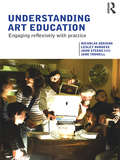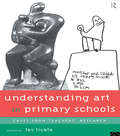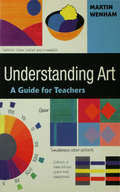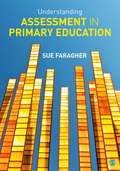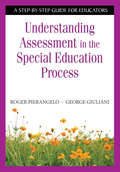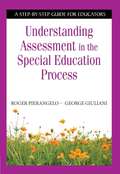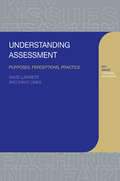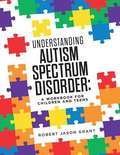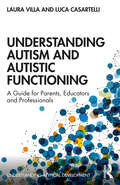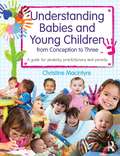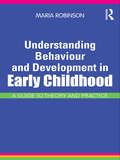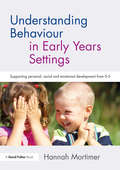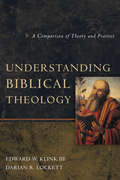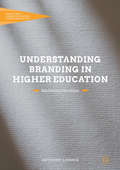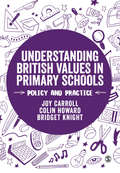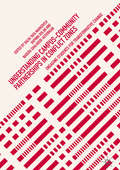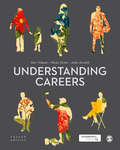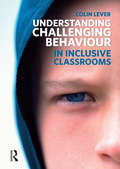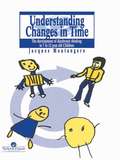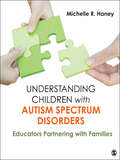- Table View
- List View
Understanding Art Education: Engaging Reflexively with Practice
by Nicholas Addison Lesley Burgess John Steers Jane TrowellWhat is distinctive about art and design as a subject in secondary schools? What contribution does it make to the wider curriculum? How can art and design develop the agency of young people? Understanding Art Education examines the theory and practice of helping young people learn in and beyond the secondary classroom. It provides guidance and stimulation for ways of thinking about art and design when preparing to teach and provides a framework within which teachers can locate their own experiences and beliefs. Designed to complement the core textbook Learning to Teach Art and Design in the Secondary School, which offers pragmatic approaches for trainee and newly-qualified teachers, this book suggests ways in which art and design teachers can engage reflexively with their continuing practice. Experts in the field explore: The histories of art and design education and their relationship to wider social and cultural developments Creativity as a foundation for learning Engaging with contemporary practice in partnership with external agencies The role of assessment in evaluating creative and collaborative practices Interdisciplinary approaches to art and design Developing dialogue as a means to address citizenship and global issues in art and design education. Understanding Art Education will be of interest to all students and practising teachers, particularly those studying at M Level, as well as teacher educators, and researchers who wish to reflect on their identity as an artist and teacher, and the ways in which the subject can inform and contribute to education and society more widely.
Understanding Art in Primary Schools
by Les TickleEven the youngest children in primary schools are now required not only to make art, but also to study it, developing an understanding of the huge variety of art and craft from different times and places. But how do teachers actually tackle this, when most have not studied art themselves? This collection brings together case studies to show how a variety of teachers have used one particular art collection as a focus for practical art. Throughout, the voices of the children involved show us how they react to their encounters with art objects. This wealth of first hand evidence and practical experience will benefit all teachers.
Understanding Art: A Guide for Teachers
by Dr Martin W WenhamIn any area of the curriculum, children need to learn concepts, facts and skills through first-hand experience. In art, such learning depends on exploring and experimenting with the visual language through which artists communicate, and the visual elements such as line, colour and shape. The National Curriculum places strong emphasis on experimenting with and applying the visual elements. This book systematically explores the basic knowledge needed to do this effectively. The author deals with the visual elements of art, their properties, how they are related, and especially with the ways in which children's knowledge of each can be developed through simple but creative activities. Each element is placed in context, with extensive cross-referencing. The author shows how these elements can be observed in the children's environment and provides examples of how they have been used in works of art and craft. This accessible book does not assume any specialist knowledge or experience. It is essential for teachers at primary and secondary levels, art co-ordinators and for undergraduate and postgraduate level students of art education. Martin Wenham is an artist, calligrapher and stone carver who has exhibited at the Craft's Council. He has taught at the University of Leicester and has over twenty years' experience of teaching in primary and secondary schools.
Understanding Assessment in Primary Education
by Sue FaragherUnderstanding assessment and being able to use it effectively is at the heart of successful primary teaching. Aware of current policy and research, this book looks at the role and purpose of assessment within education, as well as providing detailed practical guidance on the main types of classroom assessment, including formative, summative, formal and informal methods. Real classroom examples and activities illustrate the practical uses, benefits, and limitations of each form of assessment, enabling you to feel confident about implementing these strategies in your own teaching. Coverage includes: The assessment planning cycle Innovative forms of assessment, including portfolios, debates, role play and mind mapping Assessment of learners with diverse needs, including SEN and EAL The use of technology in assessment Engaging children through self-assessment and peer-assessment This is essential reading for all primary initial teacher education courses, including university-based (PGCE, PGDE, BA QTS, BEd), school-based (SCITT, School Direct, Teach First) and employment-based routes into teaching, and beginning teachers. Sue Faragher is Head of Al Basma British School, a large private school in Abu Dhabi.
Understanding Assessment in Primary Education
by Sue FaragherUnderstanding assessment and being able to use it effectively is at the heart of successful primary teaching. Aware of current policy and research, this book looks at the role and purpose of assessment within education, as well as providing detailed practical guidance on the main types of classroom assessment, including formative, summative, formal and informal methods. Real classroom examples and activities illustrate the practical uses, benefits, and limitations of each form of assessment, enabling you to feel confident about implementing these strategies in your own teaching. Coverage includes: The assessment planning cycle Innovative forms of assessment, including portfolios, debates, role play and mind mapping Assessment of learners with diverse needs, including SEN and EAL The use of technology in assessment Engaging children through self-assessment and peer-assessment This is essential reading for all primary initial teacher education courses, including university-based (PGCE, PGDE, BA QTS, BEd), school-based (SCITT, School Direct, Teach First) and employment-based routes into teaching, and beginning teachers. Sue Faragher is Head of Al Basma British School, a large private school in Abu Dhabi.
Understanding Assessment in the Special Education Process: A Step-by-Step Guide for Educators
by Roger Pierangelo George A. GiulianiThis handbook explains applicable federal regulations and clarifies the referral, assessment, and evaluation process that helps determine student eligibility for special education and related services.
Understanding Assessment in the Special Education Process: A Step-by-Step Guide for Educators
by Roger Pierangelo George GiulianiAn ideal step-by-step reference for instructors who have not had specific training in assessing students with special needs, Understanding Assessment in the Special Education Process helps educators make the most effective use of available assessment options.
Understanding Assessment: Purposes, Perceptions, Practice
by David Lambert David LinesThis is the first title in this new series, which is aimed principally at secondary PGCE and BAEd students and school- and HEI-based tutors.Each book provides a digest of the central issues around a particular topic or issues, grounded in or supported by examples of good practice, with suggestions for further reading, study and investigation. The books are not intended as 'how to' books, but rather as books which will help students and teachers to explore and understand critical theoretical issues in ways that are challenging, that invite critical reappraisals of taken-for-granted practices and perceptions, and that provide appropriate links between theory and practice. Issues related to equal opportunities and special needs are included in each separate volume . There are boxes of questions, 'think abouts' , further reading, and bulleted summary lists for the reader.This book is written specifically for teachers-in-training which will clarify the 'big picture' of monitoring and assessment and makes the crucial distinctions in this large (and still taken-for-granted) field.The authors have written widely on assessment matters and have also worked in various capacities for the QCA (and its former manifestations). They are also engagerd in initial teacher education and so know the level and market extremely well.
Understanding Autism Spectrum Disorder: A Workbook For Children And Teens (Second Edition)
by Robert GrantThe revised and expanded 2nd edition of the child and teen ASD workbooks! Children and teens often have a challenging time understanding their autism spectrum disorder diagnosis. This workbook is designed to help professionals and parents explain autism to children and teens. Each worksheet covers a different topic related to gaining awareness about autism and helping children and teens better understand what it means to have an autism spectrum disorder. Through each worksheet, children and teens have the opportunity to express their thoughts and feelings and ask questions. The workbook also provides a guide for professionals and parents offering instructions, information, and suggestions for implementing and processing through each worksheet page. Professionals and parents will find Understanding Autism Spectrum Disorder a valuable tool in working with children and teens with autism. Children and teens will enjoy the engaging worksheets as they discover and process through their complex diagnosis.
Understanding Autism and Autistic Functioning: A Guide for Parents, Educators and Professionals (Understanding Atypical Development)
by Laura Villa Luca CasartelliThis concise volume offers an accessible overview of recent clinical and research perspectives addressing autism and autistic functioning. By providing an innovative lens, the book benefits from two different angles: a concrete and pragmatical view of an expert clinician with three decades of practice in diagnosis and treatment of autism, and a more “speculative” and “long-term” view of a researcher who works on neural and computational architecture of (a)typical neurocognitive functioning.Trying to understand autism beyond its behavioral symptoms, the book spans from clinical descriptions (e.g., communicating diagnosis, clinical intervention, and prognosis) to recent neuroscientific evidence supporting a potential perspective-shift. The fil rouge of this volume can be summarized in three fundamental aspects that should orient any clinical practice in the context of autism (e.g., diagnosis, treatment, monitoring, etc.): we need an age-dependent, context-dependent, and functioning-dependent approach.Understanding Autism and Autistic Functioning is crucial reading for parents and caregivers, and professionals in health, education, and social care.
Understanding Babies and Young Children from Conception to Three: A guide for students, practitioners and parents
by Christine MacintyreWhen do babies begin to learn and what exactly are they learning? What are the key stages of a toddler’s development? Do movements such as crawling really affect later learning? How important is the environment to the under threes? What can I do to give each child the best possible support? Written to support early years professionals, this fascinating book explores the pre and post-natal development of children from conception to three. It outlines the key aspects of progression during these vital years, discussing how innate and external factors combine to influence a child’s well-being and abilities. Based upon exhaustive research in the field, but written in a way that is relevant and lively to practitioners and students alike, the text is organised in a question-and-answer format for quick and easy referencing. Topics explored and demystified, include: In-depth investigation of the ‘nature versus nuture’ debate The importance of movement in supporting development The processes of attachment and bonding Early communication and the acquisition of language The learning process and brain development. Other features include a helpful glossary of key terminology as well as suggestions for action research, making this book is an invaluable source of support for any practitioner involved in ongoing professional development. This book will help those who work with children or who are studying formal qualifications in early years education to understand and engage with the complexities of early development, enabling them to facilitate the best possible development of the children in their care.
Understanding Behaviour and Development in Early Childhood: A Guide to Theory and Practice
by Maria RobinsonIn this accessible and thought-provoking text, the author examines the behaviour of babies and young children in a developmental context, and takes into account the shifts and changes over time as young children grow and mature. Understanding Behaviour and Development in Early Childhood reveals, for example, how behaviour perceived as ‘difficult’ in a young child may be the manifestation of a response to emotional, sensory and cognitive experiences. Throughout the book, readers will find a strong emphasis on emotional well-being and the need to place our understanding of behaviour within a developmental time frame. Based on wide ranging professional experience the topics examined and discussed in this insightful book include: what we understand by ‘behaviour’ how the brain and senses work and mature during early childhood behaviour as a reflection of the child’s internal state what emotions are and how we learn what feelings mean to us as individuals how emotions affect our ability to learn how we develop a sense of self. The book provides suggestions for how adults may think about and respond to changes in children’s behaviour, and how we may support children in learning how to manage their own behaviour as they grow older and encounter wider and more complex situations. Understanding the meaning of behaviour is a constant challenge for anyone working with children. This developmental approach promotes a helpful reflective stance for practitioners and students working in early childhood education and care.
Understanding Behaviour in Early Years Settings: Supporting Personal, Social and Emotional Development from 0–5
by Hannah MortimerEverything we learn, every way we influence others and every relationship we form hangs around a complex interplay of behaviours, feelings and thoughts. This practical book explores the factors that influence children’s behaviour in the early years, enabling practitioners, parents and carers to develop a better understanding and become more intuitive and confident in supporting their development and learning in the first five years. Full of insights and strategies for supporting children when their behaviour gets in the way of learning and wellbeing, or when it is simply ‘different’ in some way, Understanding Behaviour in Early Years Settings demonstrates how practitioners can help children to feel secure, learn and explore while gaining an understanding of how to behave socially and appropriately towards others. Areas covered include building firm foundations and developing attachments; personal, social and emotional development; the language of feelings and behaviour; observing ‘problem’ behaviours and planning interventions; and supporting disability and special educational needs. Including case studies and thinking points in each chapter, this invaluable guide will help early years practitioners, teachers and students to develop their own knowledge, confidence and understanding when working with challenging behaviours.
Understanding Biblical Theology: A Comparison of Theory and Practice
by Darian R. Lockett Edward W Klink IIIUnderstanding Biblical Theology clarifies the catch-all term “biblical theology,” a movement that tries to remove the often-held dichotomy between biblical studies for the Church and as an academic pursuit. This book examines the five major schools of thought regarding biblical theology and handles each in turn, defining and giving a brief developmental history for each one, and exploring each method through the lens of one contemporary scholar who champions it. Using a spectrum between history and theology, each of five “types” of biblical theology are identified as either “more theological” or “more historical” in concern and practice: Biblical Theology as Historical Description (James Barr) Biblical Theology as History of Redemption (D. A. Carson) Biblical Theology as Worldview-Story (N. T. Wright) Biblical Theology as Canonical Approach (Brevard Childs) Biblical Theology as Theological Construction (Francis Watson). A conclusion suggests how any student of the Bible can learn from these approaches.
Understanding Branding in Higher Education
by Anthony LowrieThis book provides a critical theory of branding in higher education. The author argues for a higher education for all and positions higher education as a human right necessary for the well-being of citizens and democracy. Firstly, the book introduces the concept of desire as an underpinning for brand theory. The author then uses an explication of the concept of relevance linked with desire to further our understanding of higher education as an emancipatory project. Chapter 4 explores brand identity, which is shown to be a retroactive investment of naming. Mathemes are used to illustrate the theory of naming in identity formation. Finally, the author also examines the idea of the liberal arts and provides an ethnographic and critical discourse analysis of the liberal arts college.
Understanding British Values in Primary Schools: Policy and practice (Transforming Primary QTS Series)
by Joy Carroll Colin Howard Bridget KnightSchools must actively promote the fundamental British values of democracy, the rule of law, individual liberty, mutual respect and tolerance of those with different faiths and beliefs. The Teachers' Standards make it clear that teachers themselves must do nothing to undermine these fundamental British Values. So how do schools and teachers provide educational experiences for primary aged children that explore and promote these values? This text provides trainees, teachers and schools with practice-based advice, informed by current practitioners, relating to the delivery of ‘British Values. The content covers many topical themes and provides a unique insight into delivering ‘British Values’ in schools. It supports educational professionals to understand their duties around the PREVENT agenda and goes further to explore why this is important. It helps trainees and teachers to see how these 'values' fit within the wider context of education and what we value as educators.
Understanding British Values in Primary Schools: Policy and practice (Transforming Primary QTS Series)
by Joy Carroll Colin Howard Bridget KnightSchools must actively promote the fundamental British values of democracy, the rule of law, individual liberty, mutual respect and tolerance of those with different faiths and beliefs. The Teachers′ Standards make it clear that teachers themselves must do nothing to undermine these fundamental British Values. So how do schools and teachers provide educational experiences for primary aged children that explore and promote these values? This text provides trainees, teachers and schools with practice-based advice, informed by current practitioners, relating to the delivery of ‘British Values′. The content covers many topical themes and provides a unique insight into delivering ‘British Values’ in schools. It supports educational professionals to understand their duties around the PREVENT agenda and goes further to explore why this is important. It helps trainees and teachers to see how these ′values′ fit within the wider context of education and what we value as educators.
Understanding Campus-Community Partnerships in Conflict Zones: Engaging Students for Transformative Change
by Nadera Shalhoub-Kevorkian Dalya Yafa Markovich Daphna GolanThis book explores the opportunities and limitations of campus-community partnerships in Israel. In a conflict-ridden society with a struggling civic culture, the chapters examine partnerships at ten academic institutions, focusing on the micro-processes through which these partnerships work from the perspectives of students, NGOs, and disadvantaged communities. The editors and contributors analyse the range of strategies and cultural repertoires used to construct, maintain, negotiate and resist the various partnerships. Evaluating the various challenges raised by campus-community partnerships exposes the institutional and epistemological divides between academia and the community, and thus offers valuable insights into the ways partnerships can contribute to transformative change in conflict zones. This book will be of interest and value to researchers and students of campus-community partnerships as well as the anthropology of inclusion-exclusion and civic culture.
Understanding Careers: Metaphors of Working Lives
by John Arnold Nicky Dries J. H. InksonIn the hotly anticipated second edition of Understanding Careers, Kerr Inkson has teamed up with Nicky Dries and John Arnold to take readers on a fascinating journey through the field of Career Studies. Interdisciplinary – the text brings together and critiques a range of perspectives, allowing for a broader and more holistic understanding of the field. Theory and practice – comprehensive coverage of all the key theories and cutting edge research is related to the real world through over 50 cases studies. A new ‘Careers in Practice’ section contains chapters devoted to self-development, career counselling, and organizational practices. International perspective – contains examples, cases, research, references and statistics from a range of countries. Use of metaphor – the text is structured around commonly used metaphors for careers, helping students relate to the ideas presented and providing a framework for analysis and comparison. Ideal reading for students considering their own career and personal development, as well as those studying career development, career guidance or human resource management within a psychology, education, counselling or business degree.
Understanding Careers: Metaphors of Working Lives
by John Arnold Professor Kerr Inkson Nicky DriesIn the hotly anticipated second edition of Understanding Careers, Kerr Inkson has teamed up with Nicky Dries and John Arnold to take readers on a fascinating journey through the field of Career Studies. Interdisciplinary – the text brings together and critiques a range of perspectives, allowing for a broader and more holistic understanding of the field. Theory and practice – comprehensive coverage of all the key theories and cutting edge research is related to the real world through over 50 cases studies. A new ‘Careers in Practice’ section contains chapters devoted to self-development, career counselling, and organizational practices. International perspective – contains examples, cases, research, references and statistics from a range of countries. Use of metaphor – the text is structured around commonly used metaphors for careers, helping students relate to the ideas presented and providing a framework for analysis and comparison. Ideal reading for students considering their own career and personal development, as well as those studying career development, career guidance or human resource management within a psychology, education, counselling or business degree.
Understanding Challenging Behaviour in Inclusive Classrooms
by Colin LeverIt is no great secret that managing disruptive behaviour in any classroom, from infants to sixth form, is one of the most stressful aspects of teaching. Rules and sanctions can be effective up to a point, but often fail to take into consideration individual differences in children and the difficulties they might be experiencing in their school or home life. In his new book, Colin Lever uses real children's voices to help you begin to understand why children might behave in the way that they do, offering ideas and strategies to help prevent challenging behaviour occurring in the first place. Whether it serves as a reference manual, a useful checklist or as an aide to help you plan and prepare for your lessons, this book should be essential reading for every teacher.
Understanding Changes In Time: The Development Of Diachronic Thinking In 7-12 Year Old Children
by Jacques Montangero University of Geneva, Switzerland.This text provides an analysis of how children come to be able to understand the dynamic nature of causality - how processes take place through time. The author studies the capabilities and limitations of 7-12 year old children in order to assess their conception of evolutionary processes. His study follows on from Piaget's work on causality, and is intended to contribute to the literature on "theory of mind" and children's scientific development. The book draws on experimental studies of diachronic thinking in children and adults, and discusses the importance of a well-developed diachronic perspective for cognition.
Understanding Child and Adolescent Behaviour in the Classroom
by David Armstrong David Armstrong Julian Elliott Fiona Hallett Graham Hallett Julian Elliott Fiona HallettUnderstanding Child and Adolescent Behaviour in the Classroom is a vital guide for pre-service and in-service teachers, providing the tools to respond effectively and ethically to child and adolescent behaviour that is of concern. In this innovative book, expert authors offer 'positive rules' that will assist educators in their classroom practice. Key practical issues that are addressed include: - Building a purposeful and emotionally and psychologically positive classroom culture - Recognising and responding to children who present with social, emotional and behavioural difficulties (SEBD/EBD) - Uing research to inform and enrich classroom practice around student conduct - Working collegially to respond to the social, emotional and/or behavioural needs of individual students, including those needs associated with poor mental health and/or child protection Cutting-edge research from psychology, behavioural science and education is accessibly presented to help develop professional expertise and knowledge in the area of child and adolescent behaviour.
Understanding Children with Autism Spectrum Disorders: Educators Partnering with Families
by Michelle Rosen HaneyAs prevalence rates and awareness of Autism Spectrum Disorder (ASD) increase, there is a need for all educators to have a basic understanding of the disorder and how to teach affected children. Understanding Children with Autism Spectrum Disorders: Educators Partnering with Families introduces, in an accessible manner, the significant body of research and theory in the field of autism within the larger context of understanding the unique socio-cultural dimensions of individuals with ASD and their families.Engaging and user-friendly, Michelle Haney′s text provides future educators insight into the complexity and diversity of children with ASD, the wide range of interventions and processes for making decisions about choosing interventions (teaming with parents to provide optimal educational opportunities), and the personal/professional growth that is likely to take place during such a journey.
Understanding Children with Autism Spectrum Disorders: Educators Partnering with Families
by Michelle Rosen HaneyAs prevalence rates and awareness of Autism Spectrum Disorder (ASD) increase, there is a need for all educators to have a basic understanding of the disorder and how to teach affected children. Understanding Children with Autism Spectrum Disorders: Educators Partnering with Families introduces, in an accessible manner, the significant body of research and theory in the field of autism within the larger context of understanding the unique socio-cultural dimensions of individuals with ASD and their families.Engaging and user-friendly, Michelle Haney′s text provides future educators insight into the complexity and diversity of children with ASD, the wide range of interventions and processes for making decisions about choosing interventions (teaming with parents to provide optimal educational opportunities), and the personal/professional growth that is likely to take place during such a journey.
